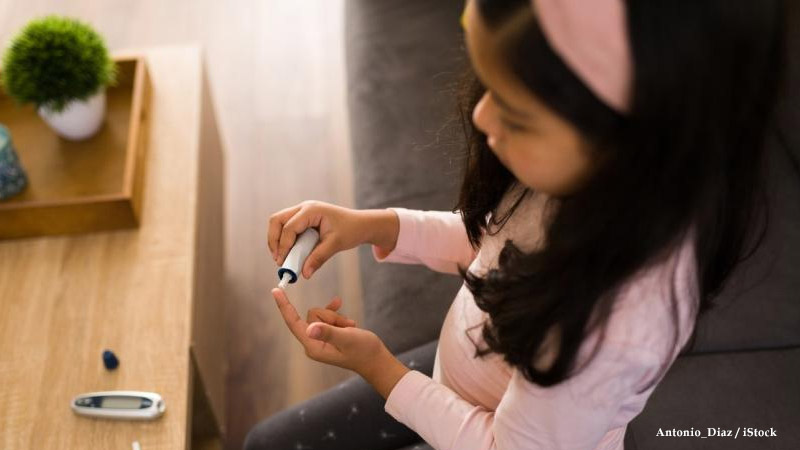Three new studies from the United States and Europe look into the possibility of a link between COVID-19 and new-onset type 1 diabetes (T1D) in children.
According to a US study involving data from 14 countries, children and adolescents have a 72% increased risk of developing T1D in the first 6 months following COVID-19 infection. Another Norwegian study found similar results, while a Scottish study concluded that the virus is unlikely to be the cause.
T1D is typically diagnosed in children as a failure of the pancreas to produce insulin.
A team led by Case Western Reserve University researchers analyzed the electronic health records of 285,628 patients aged 0 to 9 years and an equal number aged 10 to 18 years in the United States and 13 other countries who tested positive for COVID-19 or other respiratory infections from March 2020 to December 2021 in the US study, published today in JAMA Network Open.
A total of 123 (0.04%) of the 571,256 participants were newly diagnosed with T1D, compared to 72 (0.03%) who had non-COVID respiratory infections, a 72% increase. COVID-19 survivors had a significantly higher risk of T1D than those with other respiratory infections in both age groups one, three, and six months after infection.
“Type 1 diabetes is considered an autoimmune disease,” corresponding author Pamela Davis, MD, Ph.D., said in a Case Western news release. “It occurs mostly because the body’s immune defenses attack the cells that produce insulin, thereby stopping insulin production and causing the disease. COVID has been suggested to increase autoimmune responses, and our present finding reinforces that suggestion.”
Davis advises families at high risk of T1D to look for diabetes symptoms after COVID-19 infection, and pediatricians to be on the lookout for an increase in new T1D cases, especially as the highly transmissible Omicron variant circulates.
“We may see a substantial increase in this disease in the coming months to years,” she said. “Type 1 diabetes is a lifelong challenge for those who have it, and increased incidence represents substantial numbers of children afflicted.”
In the release, study coauthor Rong Xu, Ph.D., called for future research into whether the elevated risk of T1D persists, which patients are most at risk, and the treatment of COVID-associated T1D. “We are also investigating possible changes in the development of type 2 diabetes in children following SARS-CoV2 infection,” she said.
63% higher relative risk in Norway
In a Diabetologia news release, lead author Hanne Lovdal Gulseth, MD, Ph.D., said that the results suggest a link between COVID-19 and T1D, but the risk is low. “The absolute risk of developing type 1 diabetes increased from 0.08% to 0.13%, and is still low,” she said.
“The vast majority of young people who get COVID-19 will not go on to develop type 1 diabetes but it is important that clinicians and parents are aware of the signs and symptoms of type 1 diabetes,” Gulseth said. “Constant thirst, frequent urination, extreme fatigue, and unexpected weight loss are tell-tale symptoms.”
T1D has long been suspected of being an irrational immune response, possibly to a viral infection, according to the researchers, though no link to SARS-CoV-2 has been established.
“It’s possible that delays in seeking care because of the pandemic might explain some of the increases in new cases,” Gulseth said.
“However, several studies have shown that SARS-CoV-2 can attack the beta cells in the pancreas that produce insulin, which could lead to the development of type 1 diabetes. It’s also possible that inflammation caused by the virus may lead to exacerbation of already existing autoimmunity.”
Artifact of increased COVID testing?
According to the researchers, the increase in T1D diagnoses following COVID-19 infection is most likely due to increased COVID-19 testing at the time of the T1D diagnoses rather than SARS-CoV-2 itself. Furthermore, because the average time from the onset of T1D symptoms to diagnosis in patients under the age of 16 in England is about 25 days, many of those who tested positive for COVID-19 within 30 days of a diabetes diagnosis likely already had T1D, they said.
“Our findings call into question whether a direct association between COVID-19 and new-onset type 1 diabetes in adults and children exists,” corresponding author Helen Colhoun, MD, MPH, said in another Diabetologia news release.
But if the research findings are replicated, she said, “this is going to create a large number of people with newly diagnosed diabetes and might also alter the risk-benefit balance for COVID-19 vaccination in young children.”
In the release, Paul McKeigue, MBBCh, Ph.D., said that other possible causes of increases in T1D need to be explored. “We need to consider what has happened regarding the spread of viruses such as enteroviruses during the pandemic, and whether there are any other environmental factors, such as sunlight exposure and vitamin D levels, that might have altered during lockdown that might also be relevant,” he said.

